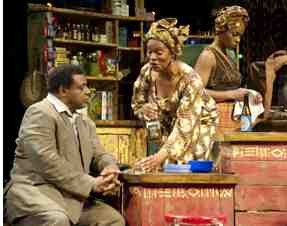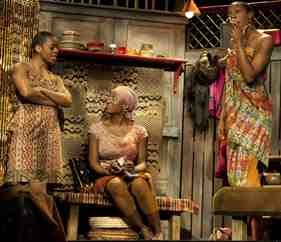Nottage's Ruined at the Denver Arts Center
A Brilliant Production Features Kim Staunton
By: Susan Hall - Apr 24, 2011
Ruined
by Lynn Nottage
Denver Center Theater Company
April 21, 2011
Directed by Seret Scott
Scenic Design Michael Ganio
Costumes David Kay Mickelsen
Lighting Jane Spencer
Sound William Burns
Musical Direction/Composition Keith E. Johnston
Mama Nadi Kim Staunton
Josephine Joy Jones
Sophie Tallia Brinson
Salima Daphne Gaines
Christian Harvy Blanks
Mr. Harari Sam Gregory
Jerome Ksembe William Oliver Watkins
Fortune Sheldon Woodley
Commander Osembenga Keith Hamilton Cobb
Much has understandably been made of late about the abuse of women around the world. There is no doubt that women’s bodies are the territory on which men’s wars are waged, whether for political ends, possession of precious minerals, during intertribal warfare, or just convenient exploitation.
Lynn Nottage had admired Bertold Brecht’s Mother Courage and wanted to try an update set in the Congo. How complicitous are women in wars that are waged? Do they use war for profit, or to enhance their position?
After interviewing Congolese women and those who care for their health and well-being, Nottage abandoned Brecht for a more measured approach. In some ways, the effect of a complex presentation is more devastating than Brecht's one-sided picture.
Certainly in the hands of director Seret Scott, a bar and club in a mining town in the Congo becomes a place if not of hope then of caring. This mining town bordello is a refuge and complicated life saver for many women.
Kim Staunton's portrayal of Mama Nadi, madam, bartender, nightclub proprietor and entrepreneur, is simply fantastic. She is full of street smarts and gumption. Real caring, buried by eons of incredibly harsh experiences, which crop up subtly from time to time, sometimes only in a gesture or a subtle expression. While we may be surprised by her final turn, we look back to find the seeds of revelation. A deep humanity is always peeking through.
Josephine is the Venus Williams of the ladies of the night with her long stemmed legs. Her skirts are as short as they come, except when she dons a long, bright red dress given to her by a trader. She hopes he will install her in a city apartment where her life can start anew. Josephine lets us know repeatedly that she is the daughter of a chief, and she looks regal.
Josephine is the old girl on the block and introduces Sophie and Salima, two girls brought in to Mama by Christian. He also delivers lipstick, cigarettes and precious Belgian chocolates. Harvy Blank has the spine of a halfback and the tenderest heart on stage in the role of Christian. He persuades Mama to take his niece Sophie, who no one else will have.
Sophie has been ‘ruined’ and walks with an awkward limp indicating how painful the after effects of her abuse are. Tallia Brinson captures her flowering: a little lipstick, a little confidence, and Mama's decision to keep her at work singing and delivering drinks instead of sex. She is saving for an operation she hopes will heal the damaged womb. In fact, she is saving tips that belong to Mama, but when Mama discovers them, she says, “Congratulations! You're the first girl brave enough to steal from me." Nothing is simple in this play, and that adds to the richness.
Salima is pregnant by a rapist and fears that Mama will find out. In the villages, women are cast out if they have sex with men other than their husbands. Although such acts are clearly not the fault of the women, they are held fully responsible. Daphne Gaines captures Salima's dilemma, having lost one child to war and now bearing another as a result of war.
Fortune, Salima's husband, comes for her. Sophie tries to convince Salima of his love. Why, she points out, he stands still out there for days at a time waiting to see you. We see him framed by circular light, as though he were the man in the moon. But Salima is all too aware that her pregnancy with a child of a ‘monster’ will never be fully accepted either by Fortune or her hometown. She ends up committing the greatest violence of all to herself.
This roadside tavern and brothel, set to be full of life and color by Michael Ganio, is not depressing. Music written by Dominic Kanza, and adapted here by Keith E. Johnston, sounds out upbeat original African tunes and rhythms.
Brecht distanced his audience from the spectacle going on before him. While the character of Mama is in some ways off putting, her compassion and kindness are evident. When the audience weeps with her at the end, as she allows a tiny bit of feeling to enter and engulf her, we are fully engaged, and not distant at all.
Later we reflect on a harsh reality: Sometimes a bad situation is better than a worse one. We can see that prostitution in a safe place. With a madam to protect, it is better than multiple, successive rapes for months at a time. That circumstance, where a woman is left with almost no womb, is really worse. We also ask if there is another way altogether, but in parts of Africa where tribal warfare continues to mindlessly rage, that question is very difficult to answer.
This superior production at the Denver Arts Center suggests that any performance you might attend will be well worth it.




